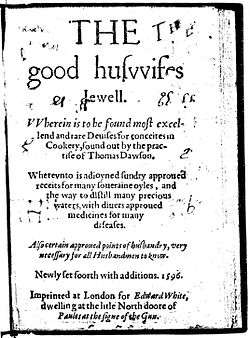Thomas Dawson (cook)
Thomas Dawson (active 1585–1620) was an English author of cookery and housekeeping books.

Life
Thomas Dawson was an author of popular cookery and housekeeping books in the late 16th century. His best-known works include The Good Huswifes Jewell (1585), The good Hus-wifes handmaid for the kitchen (1594), The Booke of Carving and Sewing (1597), and his Booke of Cookerie (1620).[1][2][3]
Books
Dawson's Good Huswifes Jewell gives recipes for making fruit tarts using fruits as varied as apple, peach, cherry, damson, pear, and mulberry. For stuffing for meat and poultry, or as he says "to farse all things", he recommends using the herbs thyme, hyssop, and parsley, mixed with egg yolk, white bread, raisins or barberries, and spices including cloves, mace, cinnamon and ginger, all in the same dish.[4] His recipe for a salad with a vinaigrette dressing runs as follows (from the 1596 edition):[5]
To make a Sallet of all kinde of hearbes.
Take your hearbes and picke them very fine into faire water, and picke your flowers by themselues, and washe them al cleane, and swing them in a strainer, and when you put them into a dish, mingle them with Cowcumbers or Lemmons payred and sliced, and scrape Suger, and put in vineger and Oyle, and throwe the flowers on the toppe of the sallet, and of euery sorte of the aforesaide things, and garnish the dish about with the forsaide thinges, and harde Egges boyled and laide about the dish and vpon the sallet.
The celebrity chef Clarissa Dickson Wright comments on Dawson's trifle that it differs from the modern recipe, as it consists only of "a pinte of thicke Creame", seasoned with sugar, ginger and rosewater, and warmed gently for serving.[6] She notes, also from the Good Huswife's Jewell, that the Elizabethans had a strong liking for sweet things.[7]
Dawson's recipes included medicines, some of which involved sympathetic magic. The Good Huswife's Jewell described "a tart to provoke courage in either man or woman", calling for the brains of male sparrows.[8] Torn sinews are healed by taking "worms while they be nice", crushing them and laying them on to the sore "and it will knit the sinew that be broken in two".[9]
References
- "The Good Huswifes Jewell - Custard and Apple Tart". The British Library. Retrieved 3 February 2016.
- Breverton, Terry (15 September 2015). The Tudor Kitchen: What the Tudors Ate & Drank. Amberley Publishing. p. 105. ISBN 978-1-4456-4875-0.
- Fitzpatrick, Dr Joan (28 April 2013). Renaissance Food from Rabelais to Shakespeare: Culinary Readings and Culinary Histories. Ashgate Publishing. p. 62. ISBN 978-1-4094-7578-1.
- Forgeng, Jeffrey L. (19 November 2009). Daily Life in Elizabethan England. ABC-CLIO. pp. 176–179. ISBN 978-0-313-36561-4.
- Extracted from http://www.medievalcookery.com/notes/ghj1596.txt, retrieved 13 September 2016.
- Dickson Wright, Clarissa (2011) A History of English Food. London: Random House. ISBN 978-1-905-21185-2. Page 123
- Dickson Wright, Clarissa (2011) A History of English Food. London: Random House. ISBN 978-1-905-21185-2. Page 147
- Ashley, Leonard R. N. (1988). Elizabethan Popular Culture. Popular Press. p. 231. ISBN 978-0-87972-427-6.
- "Review of 'The Time Traveller's Guide to Elizabethan England By Ian Mortimer'". We Love This Book. Retrieved 4 February 2016.
External links
- Gode Cookery PDFs including Good Huswifes Jewell 1596 and The Good Huswives Handmaide 1597
- The Good Huswives Handmaide for the Kitchin 1594 (.htm)
- Good Huswifes Jewell 1596 (.txt)